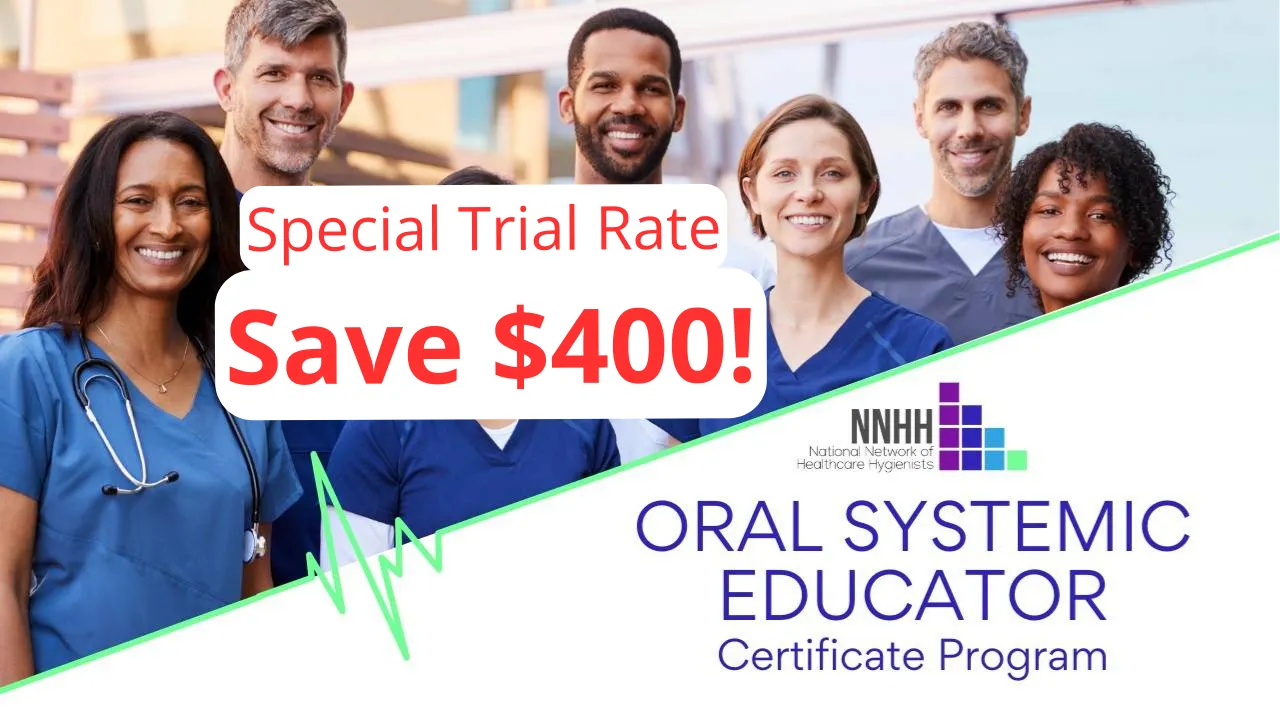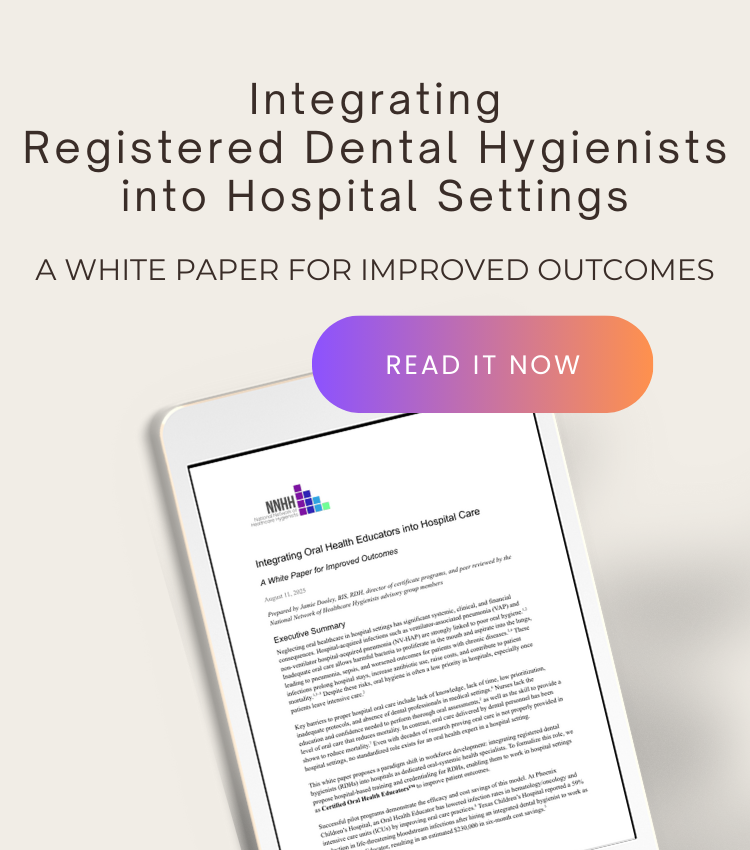
7 Certificate Programs Dental Hygienists Should Consider in 2026
Jun 25, 2025As dentistry and medicine work toward better integration, Registered Dental Hygienists (RDHs) continue to be instrumental in the shifts that are occurring. As the prevention specialists of dentistry, some further their education beyond licensure, securing a Master’s or Doctorate degree. For some, however, it is not feasible due to time, family demands, or finances. Certificate programs build on the education an RDH already has, training them for expanded roles and career opportunities at a fraction of the time and cost.
The idea of specialization in the field of dental hygiene is not new. We already have hygienists who specialize in periodontics, cosmetic dentistry, and pediatrics. They learn specialty information on the job from fellow dental providers, or are tasked with piecing together continuing education that fits their specialty needs via internet search.
Unfortunately, it's rare to find continuing education that is specific to the practice of dental hygiene, but these certificate programs demonstrate that an RDH has met specific industry standards and possesses recognized expertise.
Certificate Programs and Certifications for RDHs:
1. Oral Systemic Educator Certificate™
For Registered Dental Hygienists (RDHs) seeking to expand their impact beyond dental health alone, the Oral Systemic Educator Certificate Program™ offers a transformative opportunity. Developed by the National Network of Healthcare Hygienists (NNHH), this self-paced, fully online program is the first dental hygiene training program in the world to earn ANSI/ASTM Accreditation (E2659), setting a new global benchmark for quality assurance. The 35 hour curriculum delves into intricate connections between oral health and systemic conditions in 18 specialty areas of medicine, plus adds modules on collaborative care, leadership and more. RDHs are equipped with evidence-based knowledge and communication strategies to more confidently educate their patients chairside and collaborate effectively with interdisciplinary healthcare teams. The program culminates in a Capstone Project, enabling participants to apply their learning by developing and presenting an oral-systemic education course in their chosen area of focus. Graduates earn the CH-OSE (Certificate Holder in Oral Systemic Education) credential, distinguishing themselves as leaders in integrative, patient-centered care. This credential not only enhances clinical practice but also opens doors to roles in public health, education, and healthcare leadership, empowering RDHs to drive meaningful change in their communities.
2. Community Dental Health Coordinator Certificate
The Community Dental Health Coordinator (CDHC) Certificate Program is designed for dental hygienists and assistants aiming to expand their roles in community-based oral health care. This program equips participants with skills in patient navigation, oral health education, and care coordination, focusing on serving underserved populations. Training encompasses cultural competency, communication strategies, and preventive services, enabling CDHCs to bridge gaps between communities and dental health systems. Programs are typically offered online and can be completed in 9 to 12 months, allowing flexibility for working professionals. Graduates are prepared to work in various settings, including schools, clinics, and public health organizations, to promote oral health and reduce disparities in dental care access. Check your state universities and local health departments for programs as grant funding is often available.
3. Oncology Certificate for RDHs™
The Oncology Certificate Program™ is a comprehensive, self-paced course developed by the National Network of Healthcare Hygienists (NNHH). Designed to equip RDHs with specialized knowledge, the program offers 18 AGD PACE credit hours and focuses on the oral implications of cancer treatments. Participants learn to effectively collaborate within multidisciplinary oncology teams, advocating for oral health in both adult and pediatric oncology care settings, and earn the credential CH-ONC. The course enhances an RDHs' ability to manage oral complications associated with cancer therapies, such as mucositis, xerostomia, and infections. By completing the program, RDHs can play a pivotal role in improving the quality of life for cancer patients through proactive oral health care. The course is entirely online, allowing for flexible learning tailored to the professional's schedule. For dental hygienists seeking to expand their expertise and contribute meaningfully to oncology care, this certificate program offers a valuable opportunity to enhance patient outcomes and advance professional development.
4.The Cotten Method™ Certificate Program
The Cotten Method™ Certificate Program is a specialized online course designed to empower dental professionals—particularly Registered Dental Hygienists (RDHs)—with advanced skills in head, neck, oral, and oropharyngeal cancer screening. Developed by Susan Cotten, BSDH, RDH, OMT, an esteemed oral cancer consultant and founder of Oral Cancer Consulting, the program emphasizes a comprehensive, science-based approach to early detection. Structured around four foundational pillars—etiologies, risk factors, signs and symptoms, and thorough visual and tactile evaluations—the course offers 3.5 AGD PACE credit hours and is entirely self-paced and online. Participants gain confidence in conducting comprehensive screenings, learn to identify subtle signs of cancer, and understand the importance of meticulous documentation to reduce liability. The program also highlights the latest techniques and equipment available, enabling dental professionals to provide optimal care and potentially increase revenue through enhanced service offerings. By completing this certificate, RDHs can distinguish themselves as leaders in oral cancer prevention, collaborate effectively with local cancer treatment facilities for bi-directional referrals, and demonstrate a commitment to providing the highest standard of care in their communities.
5. Leadership Certificate Program for RDHs™
The Leadership Certificate Program for Dental Hygienists™ , offered by Beyond Dental Hygiene is a seven-unit online course designed to empower RDHs to expand their careers beyond clinical practice. Led by experienced dental hygienists Jessica Havens and Deb Daniel, the curriculum covers essential topics such as leadership theories, human resources, project management, program development, diversity and inclusion, and mentorship. This program aims to cultivate leadership skills applicable in diverse professional environments, enabling RDHs to take on roles in healthcare administration, education, and public health.
6. Orofacial Recovery Specialist Certificate™ - Level 1
The Orofacial Recovery Specialist Program™ is a groundbreaking opportunity for dental providers looking to expand their scope and impact in patient care. Designed by Rebecka Clark of the Orofacial Recovery Institute as course "one of three," it addresses the growing demand for integrative recovery solutions following oral and facial procedures. This specialized training equips dental professionals with the knowledge and skills to support healing, reduce inflammation, and improve functional outcomes. From post-surgical recovery to managing chronic orofacial pain, the program emphasizes therapeutic interventions, soft tissue techniques, and collaborative care models. Graduates emerge as valuable allies in both surgical and non-surgical recovery, positioning themselves at the forefront of whole-body oral health support.
7. Public Health Certificate
Some states require a public health certificate to practice in non-dental settings with indirect supervision. For example, states like Alaska, Arizona, Colorado, Connecticut, Maine, and Michigan allow dental hygienists to work with less direct supervision in certain settings. California has a specific license for independent practice in alternative settings. Other states, such as Idaho, Kansas, Illinois, Iowa, and Massachusetts, have mechanisms like endorsements or permits to facilitate practice in public health or community settings. Check your state or province practice guidelines for education requirements and forms needed.
We hope you found inspiration today that will help you revitalize your career and distinguish yourself moving forward. Learn more about the difference between approved CE, certificate programs, certifications and accredited programs, HERE.
This article was originally written in 2023 and is updated each year. If you know of a certificate program that should be included, email [email protected].











